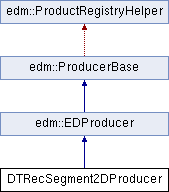


|
 |
#include <DTRecSegment2DProducer.h>

Public Member Functions | |
| DTRecSegment2DProducer (const edm::ParameterSet &) | |
| Constructor. | |
| virtual void | produce (edm::Event &event, const edm::EventSetup &setup) |
| The method which produces the 2D-segments. | |
| virtual | ~DTRecSegment2DProducer () |
| Destructor. | |
Private Attributes | |
| bool | debug |
| DTRecSegment2DBaseAlgo * | theAlgo |
| edm::InputTag | theRecHits1DLabel |
Producer for DT segment in one projection.
Definition at line 33 of file DTRecSegment2DProducer.h.
| DTRecSegment2DProducer::DTRecSegment2DProducer | ( | const edm::ParameterSet & | pset | ) |
Constructor.
Definition at line 38 of file DTRecSegment2DProducer.cc.
References gather_cfg::cout, debug, reco::get(), edm::ParameterSet::getParameter(), and edm::ParameterSet::getUntrackedParameter().
{
// Set verbose output
debug = pset.getUntrackedParameter<bool>("debug");
// the name of the 1D rec hits collection
theRecHits1DLabel = pset.getParameter<InputTag>("recHits1DLabel");
if(debug)
cout << "[DTRecSegment2DProducer] Constructor called" << endl;
produces<DTRecSegment2DCollection>();
// Get the concrete reconstruction algo from the factory
string theAlgoName = pset.getParameter<string>("Reco2DAlgoName");
if(debug) cout << "the Reco2D AlgoName is " << theAlgoName << endl;
theAlgo = DTRecSegment2DAlgoFactory::get()->create(theAlgoName,
pset.getParameter<ParameterSet>("Reco2DAlgoConfig"));
}
| DTRecSegment2DProducer::~DTRecSegment2DProducer | ( | ) | [virtual] |
Destructor.
Definition at line 58 of file DTRecSegment2DProducer.cc.
References gather_cfg::cout, and debug.
| void DTRecSegment2DProducer::produce | ( | edm::Event & | event, |
| const edm::EventSetup & | setup | ||
| ) | [virtual] |
The method which produces the 2D-segments.
Implements edm::EDProducer.
Definition at line 65 of file DTRecSegment2DProducer.cc.
References edm::OwnVector< T, P >::begin(), gather_cfg::cout, debug, edm::OwnVector< T, P >::end(), edm::EventSetup::get(), DTRangeMapAccessor::layersBySuperLayer(), edm::OwnVector< T, P >::size(), and DTLayerId::superlayerId().
{
if(debug)
cout << "[DTRecSegment2DProducer] produce called" << endl;
// Get the DT Geometry
ESHandle<DTGeometry> dtGeom;
setup.get<MuonGeometryRecord>().get(dtGeom);
theAlgo->setES(setup);
// Get the 1D rechits from the event
Handle<DTRecHitCollection> allHits;
event.getByLabel(theRecHits1DLabel, allHits);
// Create the pointer to the collection which will store the rechits
auto_ptr<DTRecSegment2DCollection> segments(new DTRecSegment2DCollection());
// Iterate through all hit collections ordered by LayerId
DTRecHitCollection::id_iterator dtLayerIt;
DTSuperLayerId oldSlId;
for (dtLayerIt = allHits->id_begin(); dtLayerIt != allHits->id_end(); ++dtLayerIt){
// The layerId
DTLayerId layerId = (*dtLayerIt);
const DTSuperLayerId SLId = layerId.superlayerId();
if (SLId==oldSlId) continue; // I'm on the same SL as before
oldSlId = SLId;
if(debug) cout <<"Reconstructing the 2D segments in "<< SLId << endl;
const DTSuperLayer* sl = dtGeom->superLayer(SLId);
// Get all the rec hit in the same superLayer in which layerId relies
DTRecHitCollection::range range =
allHits->get(DTRangeMapAccessor::layersBySuperLayer(SLId));
// Fill the vector with the 1D RecHit
vector<DTRecHit1DPair> pairs(range.first,range.second);
if(debug) cout << "Number of 1D-RecHit pairs " << pairs.size() << endl;
if(debug) cout << "Start the 2D-segments Reco "<< endl;
OwnVector<DTSLRecSegment2D> segs = theAlgo->reconstruct(sl, pairs);
if(debug) cout << "Number of Reconstructed segments: " << segs.size() << endl;
if (segs.size() > 0 )
segments->put(SLId, segs.begin(),segs.end());
}
event.put(segments);
}
bool DTRecSegment2DProducer::debug [private] |
Definition at line 52 of file DTRecSegment2DProducer.h.
Definition at line 55 of file DTRecSegment2DProducer.h.
Definition at line 58 of file DTRecSegment2DProducer.h.
 1.7.3
1.7.3